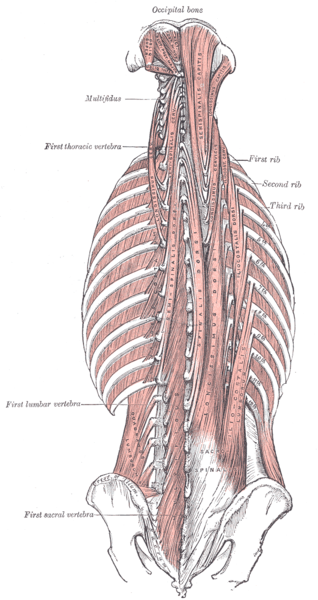Erector Spinae: Difference between revisions
Aarti Sareen (talk | contribs) No edit summary |
Aarti Sareen (talk | contribs) No edit summary |
||
| Line 1: | Line 1: | ||
<div class="editorbox">
'''Original Editor '''- [[User:Aarti Sareen|Aarti Sareen]]</div><div class="editorbox">'''Top Contributors''' - {{Special:Contributors/{{FULLPAGENAME}}}}
</div> | <div class="editorbox">
'''Original Editor '''- [[User:Aarti Sareen|Aarti Sareen]]</div><div class="editorbox">'''Top Contributors''' - {{Special:Contributors/{{FULLPAGENAME}}}}
</div> | ||
== Introduction == | == Introduction == | ||
Erector spinae is group of muscles of back which extends the vertebreal column. It is also known as sacrospinalis and extensor spinae in some texts<ref>Terminologia Anatomica, 1999.</ref>. It is paired formed of 3 other muscles and tendons and runs more or less vertically. It extends throughout the lumbar, thoracic and cervical regions, and lies in the groove to the side of the vertebral column. In cervical region it is covered by nucal ligament and in thoracic and lumber region by thoracolumbar fascia.It is made up of 3 muscles:<br> | |||
*Medially by Spinalis <br> | |||
*Centerally by Longissimus<br> | |||
*Laterally by Illiocostalis<br> | |||
The spinalis is just next to the spine, and to work on this muscle fingertips or thumbs can be used easily. The longissimus forms the main meat of the erector group, and is palpated as a taught rope half an inch lateral to the spine. The attachment of the iliocostalis is to the ilium and ribs. Because of it's lateral position, a tight iliocostalis can bring a hip up, or bring the ribcage down toward the hip. <br> | |||
Each of these have 3 parts further.<br> | |||
{| width="710" cellspacing="1" cellpadding="1" border="1" height="92" | |||
|- | |||
| SPINALIS<br> | |||
| LONGISSIMUS<br> | |||
| ILLIOCOSTALIS<br> | |||
|- | |||
| spinalis capitis<br> | |||
| longissimus capitis<br> | |||
| illiocostalis cervicis<br> | |||
|- | |||
| spinalis cervicis<br> | |||
| longissimus cervicis<br> | |||
| illiocostalis thoracis<br> | |||
|- | |||
| spinalis thoracis<br> | |||
| longissimus thoracis<br> | |||
| illiocostalis lumborum<br> | |||
|} | |||
<br> | |||
[[Image:Erector_spinae.png]]<br> | |||
<br> | |||
== Anatomy == | == Anatomy == | ||
Revision as of 20:33, 7 November 2013
Introduction[edit | edit source]
Erector spinae is group of muscles of back which extends the vertebreal column. It is also known as sacrospinalis and extensor spinae in some texts[1]. It is paired formed of 3 other muscles and tendons and runs more or less vertically. It extends throughout the lumbar, thoracic and cervical regions, and lies in the groove to the side of the vertebral column. In cervical region it is covered by nucal ligament and in thoracic and lumber region by thoracolumbar fascia.It is made up of 3 muscles:
- Medially by Spinalis
- Centerally by Longissimus
- Laterally by Illiocostalis
The spinalis is just next to the spine, and to work on this muscle fingertips or thumbs can be used easily. The longissimus forms the main meat of the erector group, and is palpated as a taught rope half an inch lateral to the spine. The attachment of the iliocostalis is to the ilium and ribs. Because of it's lateral position, a tight iliocostalis can bring a hip up, or bring the ribcage down toward the hip.
Each of these have 3 parts further.
| SPINALIS |
LONGISSIMUS |
ILLIOCOSTALIS |
| spinalis capitis |
longissimus capitis |
illiocostalis cervicis |
| spinalis cervicis |
longissimus cervicis |
illiocostalis thoracis |
| spinalis thoracis |
longissimus thoracis |
illiocostalis lumborum |
Anatomy[edit | edit source]
Function and Training
[edit | edit source]
Muscle testing[edit | edit source]
References[edit | edit source]
- ↑ Terminologia Anatomica, 1999.







